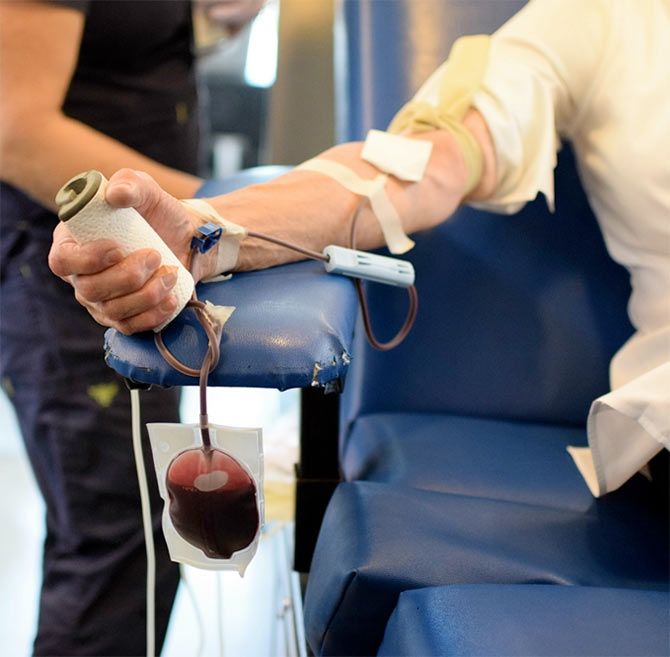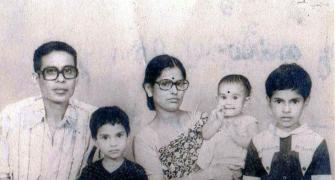Google celebrates Karl Landsteiner's 148th birthday today with a doodle.
Professor Landsteiner, the Nobel Prize-winning biologist, first classified blood into groups.
June 14 is appropriately commemorated as World Blood Donor's Day.
Before you head to donate blood, Dr Balbir Singh Kohli shares some Dos and Don'ts to keep in mind.

Blood is a scarce and much needed component in medical procedures like surgeries, cancer treatments, blood transfusions, organ complications and so on.
Blood donation is the only method via which, blood from voluntary donors can be transferred to those in need.
Considering that the number of donors is low, there is a tremendous value and demand for blood in the blackmarket.
Blackmarketing of blood is both a social and economic evil not to mention the health hazards.
One must, therefore, proceed with extreme caution while donating blood.
Personal health and hygiene are a pre-requisite for donating blood.
Also, do bear in mind, that you must only donate to recognised institutions, hospitals and camps.
Dos and don'ts for a safe and successful blood transfusion
Legislative criteria
As per the Drugs and Cosmetics Act 1940 following condition have been laid down for individuals who wish to donate their blood:
- Age limit: 18 to 40 years of age
- Weight: Not under 45 kg
- Normal blood pressure levels: 120/80 mm Hg
- Haemoglobin level 12.5 gm
- Donor must be free from acute respiratory diseases, skin and other diseases transmittable on blood transfusion.
- Donor must be free from puncture and scar marks on arms and forearms indicating professional blood donor or drug abuser.
If your decision to donate blood is pre-planned, begin by modifying your diet accordingly.
A couple of days before, start including iron rich foods like spinach, red meat, fish and cereals that have iron content.
Avoid junk food and alcohol as it may be flagged in the initial blood test as an adverse case and you may not be allowed go ahead with the donation.
People who have a tendency to smoke must avoid smoking during this time as the nicotine aggravates dizziness and you may faint.
A good night's rest is vital! Get at least eight hours of sleep before you head for the camp or hospital.
Prior to and immediately after donating blood, make sure you have taken enough water, electrolytes, fruit juices, etc. The draining of blood from the body dehydrates you and that may lead to dizziness coupled with the loss of strength and sense of balance.
Nervousness and anxiety are common after-effects of blood donation.
As a precautionary measure, take a friend or a relative with you.
You may also talk and share your concerns to the concerned person and authorities who are conducting the donation.
If you feel unwell, alert them of the situation, most of the time just talking to someone gets you back on your feet.
After you have donated, do not start walking or engage in any physical activity straight away.
If there are recliners available, take a couple of minutes to relax or just put your head down and in-between your knees. This will help increase the blood flow to your brain.
Make sure you have a full, nutritious meal, (particularly rich in carbohydrates, protein and iron) soon after the donation. This helps the body generate plasma and blood cells to compensate for the loss of blood.
Do not remove the strip bandage applied on the needle site immediately after donating blood. If left open, it may cause infection or irritation.
Make sure you attend to a registered hospital or camp for blood donation. Certain places provide you with a donor certificate make sure your collect yours. This will help your get access to blood on priority in case you happen to have a blood emergency in the future. Most certificates are valid up to six months.
Make sure the needles and other equipment used are sterilised and the personnel conducting the procedure use proper sanitation apparels like gloves and masks etc.
Take efforts to make a healthy and safe donation for you and others around you.
Blood transfusion
This is the process of receiving blood from another person through an IV bag. Today, thanks to the centrifuge technology individual components of blood can be administered to the patient.
Blood plasma or platelets or red and white blood cells can be specifically transferred as per the requirement of the patient as opposed to whole blood transfusion.
During the transfusion, the patient is always at risk of contracting infection from unscreened blood -- when the proper test of the donor has not been conducted before accepting her/his blood.
The issue is far serious in our country, particularly when almost 2,234 individuals have reported having been infected with HIV during a blood transfusion in the past 17 months alone.
Countries like Canada, on the other hand, have not reported such incidents since 1985. The last reported incident in the UK and the USA was in 2005 and 2008 respectively.
The following safety precautions have to be embedded in the system as well as amongst individuals to secure them from the risks associated with bad transfusion
Transfusion, only when necessary
It must be first ascertained that the patient will, in fact, benefit from the transfusion.
A complete blood count for platelets, red and a white blood cell needs to be performed.
Also, tests for clotting needs to be carried out. Most patients who suffer from dengue are provided with transfusions even when it is not required.
The use of transfusion with a level of responsibility must take precedent over all precautionary measures.
Proper screening
Proper screening process must be conducted before accepting blood from any individual.
Haemoglobin levels of the donor must be checked. The donor must be asked to declare prior history of medical issues and infections.
After collection, the blood must be examined for terminal infections like Hepatitis and HIV+.
Identification
The identity and the blood group of the patient must be clearly set out, cross checked and matched with that of the donor to avoid and complications on account of mismatch.
Trained staff
The procedure needs to be monitored by experienced doctors and trained personnel. The heart rate, temperature and blood pressure needs to be watched during the entire time.
After-effects
Experiencing fever after the transfusion is a common after effect owing to the white blood cells content in the donor's blood. This can be relieved with proper medication.
Such procedures must be undertaken under the guidance of experienced doctors and in hospitals that are well equipped for the same.
Blood transfusion may not always be necessary but in the event it does become essential you must proceed with abundant precaution. Only accept blood from blood banks that are recognised by the National Aids Control Organisation.
Make sure the IV bags are labelled with all the necessary details and the same match with your blood group.
Keep tabs on the expiry date of the IV bag as blood degrades over a period of time.
Dr Balbir Singh Kohli, specialist, Healthenablr India, has over 10 years of experience as a health specialist. He is currently associated with Aastha Health Care.
Photograph: Kind courtesy Vegasjon/Wikimedia Commons









